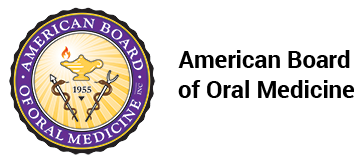About the American Board of Oral MedicineThe American Board of Oral Medicine (ABOM) is a 501c(6) non-profit organization. Mission: To certify the achievement of in-depth knowledge and proficiency in the full scope of Oral Medicine through examination and continuous certification. Vision: To establish a future where board-certified Oral Medicine practitioners are universally recognized as the leading experts in medically-integrated oral healthcare by the public, dental and medical communities, and payers. Objectives and Function:
HistoryThe American Academy of Oral Medicine (AAOM) was founded in 1945 by Samuel Charles Miller, and today flourishes as an organization that advances the field of Oral Medicine and is dedicated to obtaining dental specialty recognition. Dr. Samuel Charles Miller was chairman of periodontology and oral medicine at New York University College of Dentistry between 1934 and 1950s. In the 1950s and 1960s, certified training programs in oral medicine spread throughout the United States and as a result, the founding members of AAOM recognized the need for an examining board to establish uniformity of training for oral medicine residencies and to meet the demand of dental education for curriculum guidelines in oral medicine. Accordingly, the American Academy of Oral Medicine established the American Board of Oral Medicine (ABOM) in 1956. The directors of the first board and the first board examiners were: Drs. Samuel Charles Miller, Lester W. Burkett, Joseph F. Volker, Irving Glickman, Herman M. Becks and Harold R. Gelhaar. All were faculty at dental schools. Today, ABOM—although originally sponsored by AAOM—operates as an independent entity with the objective of providing certification of graduates of recognized advanced education programs in oral medicine. GovernanceABOM has seven directors who serve a maximum of one seven-year term, with the most senior director serving as the president in his/her last year of tenure. All directors are Diplomates of the board. There is one president, one vice-president, one secretary, one treasurer and three other members. In any one year, there is a "director-in-training" who is the newest director, who observes for one year in an unofficial capacity. This "director-in-training" is chosen for his/her specialty and field of interest to replace the outgoing president who has a similar specialty and field of interest. All members prepare examinations for each of the seven sections that are examined:
The board encourages continuing education through a continuing education requirement to maintain current Diplomate status. The board collects an annual registration fee from its diplomats to support the board's function. |
